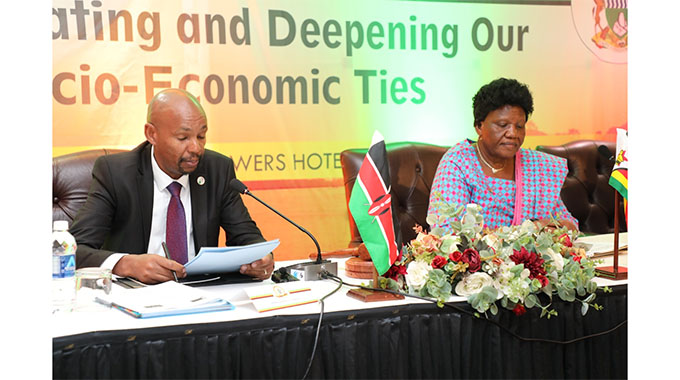EDITORIAL COMMENT: DW reopening plugs a huge industrial gap

The reopening, or more precisely the recommissioning, of David Whitehead Textiles in Chegutu is restoring one of the critical primary industries Zimbabwe lost over the last couple of decades and restores that major missing link between our farmers and our consumers.
At the same time, it appears that our cotton farmers have not just gained a new market in Zimbabwe, and are seeing their farming operations returning to viability, but will also be able to enjoy higher yields and lower costs as progress is made towards the introduction of genetically modified varieties that fight the worst pests without chemicals.
At its peak David Whitehead was a critical part of our industrial base, spinning and weaving our cotton into a wide range of fabrics that supplied the next tier of related industries, the garment factories and tailors, with their major raw material, quality fabric, while adding significant value to cotton exports.
As with other sections of the primary industrial base, a lack of investment into replacing machinery and upgrading technologies saw David Whitehead falter and when Lonrho pulled out after the death of Roland “Tiny” Rowland, the company headed towards collapse and closure.
In the last few years we have seen the incredibly weird occurrence of Zimbabwean garment manufacturers importing cotton fabric into a cotton producing country, and anyone moving around the fabric shops in Harare will be bemused to find every single bolt of fabric is imported.
The new investor, Agro Value Chain Limited Zimbabwe, a subsidiary of ETG Parrowgate, with its shining record of investment across a swathe of Zimbabwean industry, managed to acquire a majority shareholding a few years ago, but there were delays on the reopening as legal battles were waged by a small minority of the minority shareholders who could not raise the finance themselves, but did not want anyone else to rebuild the company.
Hopefully our pro-investment stance which has seen the High Court revamping and upgrading its new Commercial Division will ensure that similar problems in other sectors will not have the same troubles, but Parrowgate stuck it out and will now be reaping the rewards of both its investment and its patience.
The importance of the new investment and the related reopening was shown by the decision of President Mnangagwa to personally officiate over the reopening ceremony.
And he wants the investor to dream big, as he brought up the trade deals and the free-trade areas that Government has been joining.
Parrogate already know about Zimbabwe being open for business, being a huge investor in the oil-seed processing industries as well as cotton.
And the continued new investment shows that this investment policy works. Someone who has already invested is now investing more, and “repeat custom” is always the best test.
David Whitehead will obviously be a major winner in the trade deals and free trade areas, as Zimbabwean cotton lint spun into Zimbabwean thread and woven into Zimbabwean fabric will meet any conceivable rules of origin.
In the end we should never be exporting cotton lint, only fabric and clothes.
At the opening ceremonies there were those who hoped that AVC, which also has a cotton ginnery in Chegutu, along with a new extension to its oil expressing business, would be hiring local.
Parrogate chairman Mr Pradeep Garadiwal has an excellent track record on this score in both Zambia and Zimbabwe, being one of those desirable and respectable investors who wants his payroll to be totally local.
This is, in any case, good business especially when you have access to a skilled population that can be quickly trained.
Local staff do not need home leave, boarding school fees for their children back home, frequent flights home, and all sorts of other extra costs. And they do not get homesick.
And he has already shown his willingness to be a decent employer by assuring the local and provincial authorities that he sees the need to build up Chegutu’s housing stock so his workforce have a roof over their heads.
The new 40-bed hospital in Chegutu might be labelled as corporate social responsibility, but it is also good business.
When you are easily the largest employer in a town, and AVC with David Whitehead, its ginnery and its cooking oil business is easily the largest, having a decent hospital round the corner for sick staff and their families makes a lot more sense than the HR manager coping with the logistics of rushing the sick to Harare. But it is nice that AVC is sharing with the rest of the town.
One requirement will be to ensure Zimbabwean cotton farmers grown enough cotton to feed the textile mills and the other users of cotton. Production did decline for all sorts of unnecessary reasons, but is building up again fast. But it can grow even faster and produce even more money for the farmers.
Zimbabwe has been very nervous about genetically modified organisms, despite having a good set of laws that allow these to be licensed when each has shown itself to be safe.
For cotton the main modifications are for increased yield, always a good idea, and for natural protection against the worst pests.
We need to speed up our processes when the modified varieties have proven themselves elsewhere and there is enough data to know if there is any hidden downside.
Zimbabwe has always accepted good science, and after checks have been made and the scientific consensus is in favour of a particular course of action that has huge benefits and negligible danger we should follow the advice.










Comments